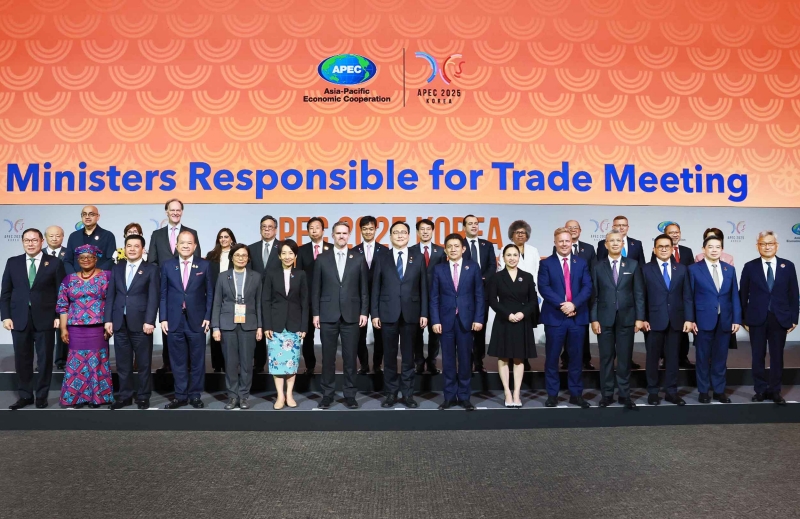
Officials at the opening ceremony of the 2025 Asia-Pacific Economic Cooperation (APEC) Ministers Responsible for Trade meeting on May 15 pose for a group photo at International Convention Center Jeju in Seogwipo, Jeju Island. (Ministry of Trade, Industry and Energy)
By Park Hyeri
The 21 member economies of the Asia-Pacific Economic Cooperation (APEC) have pledged to help the restoration of the multilateral trading system centered on the World Trade Organization (WTO) and cooperate in responding to uncertainty in global trade conditions.
The Ministry of Trade, Industry and Energy in Seoul on May 16 said a joint statement containing this content was unanimously adopted at the APEC Ministers Responsible for Trade meeting from May 15-16 at International Convention Center Jeju in Seogwipo, Jeju Island.
In the talks, the ministers expressed concern over fundamental challenges facing the global trading environment and agreed on the importance of the WTO, which provides the legal foundation for the multilateral trading system to advance trade.
WTO Director-General Ngozi Okonjo-Iweala said the WTO will again emerge as a relevant institution for fostering a stable and predictable trade environment, urging APEC trade ministers for political support to advance comprehensive WTO reform.
Korea also received broad support from APEC for its proposed initiative AI for Trade, which outlines three key agendas: expand the application of artificial intelligence (AI) in tariff and customs administration; enhance public understanding of AI policy in each member country's economy; and promote the voluntarily exchange of data on AI standards and technologies.
To further develop this plan, the ministry in August will host the AI Trade Public-Private Dialogue in Incheon.
APEC also reaffirmed that the digital economy is a key driver of regional economic growth and pledged continued cooperation in sectors like bridging the digital divide, boosting digital infrastructure and facilitating data flows.
After discussing reshaping supply chains and building sustainable supply chains in response to the climate crisis, APEC also agreed to expand the use of the virtual APEC Business Travel Card to stimulate business exchange.
"Due to recent sharp differences in stances on the global trade environment, reaching a consensus at this trade ministers' meeting was a great challenge for me as chair, as well as for the 20 trade ministers and the 100-member joint negotiating team that drafted the joint statement," said Minister for Trade Cheong Inkyo, who chaired the meeting. "After intense discussion and consideration, we agreed that the 'miracle of Jeju' is a milestone agreement in APEC history."
"Based on the outcomes of this meeting, we will do all we can to achieve tangible results at the Foreign and Trade Ministers' Meeting and the Summit scheduled for the second half of the year."
hrhr@korea.kr